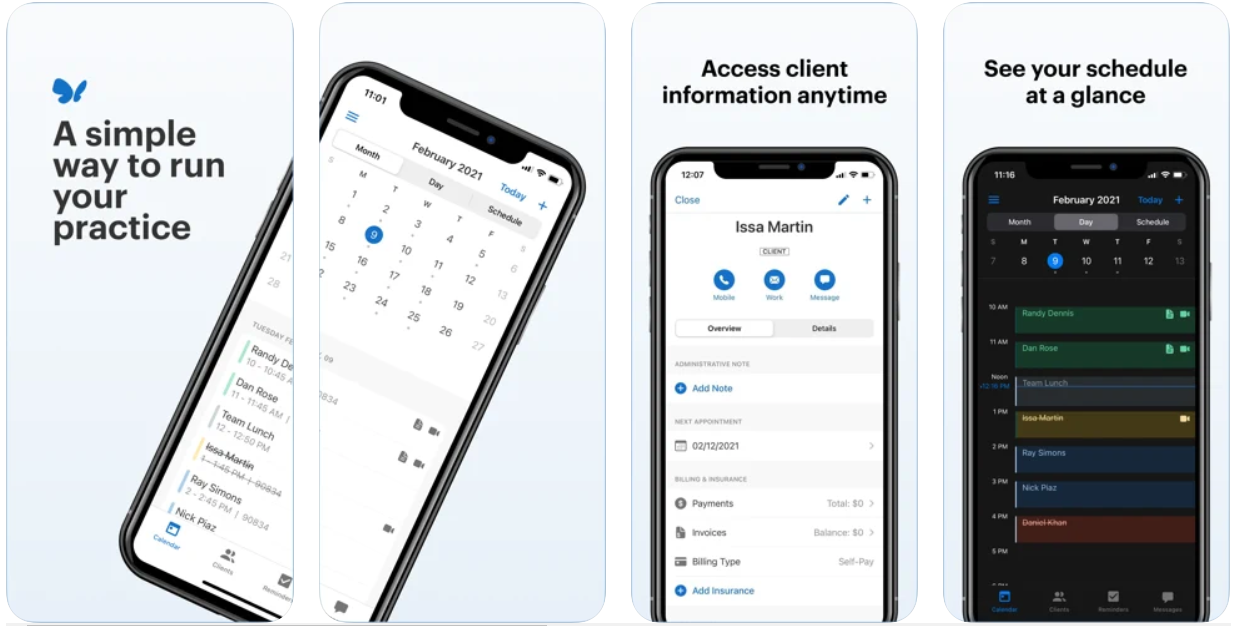
Healthcare professionals carry a high level of responsibility; they don’t have time for things that aren’t life-saving, such as data entry and practice administration. A busy, expanding medical practice must keep up with the speed of innovation in today’s fast-paced, digital environment in order to improve the patient experience. Do you want to make your medical practices more efficient by creating a smooth billing system with a streamlined administration process?
If you answered yes, you could require a best practice management app. The healthcare market is undergoing a technological revolution, with health technology supporting physicians in achieving efficiency improvements. The utilization of an appointment booking app and a practice management app leads to better clinical outcomes and helps to preserve staff morale.

Image Source
Presently, there are many practice management apps available in the market, out of which Simple Practice is one of the most prominent ones.
Although all doctors have the main responsibility of delivering the best feasible treatment to their patients, private practice doctors also have the additional burden of managing the activities. It is critical to distinguish yourself from competition, regardless of the type of healthcare practice you own. One of the most effective methods to achieve this is to use a custom practice management app. This blog is for you if you haven’t yet realized the value of a practice management app in terms of streamlining your operations, reducing stress, and freeing up your valuable time. Prepare to learn new things and make well-informed business decisions. We’ll go through everything you need to know about developing a practice management software in this article.
Today, in this blog, we’ll discuss how to develop an app like a simple practice app? Apart from this, we will discuss the following:
So, let’s start!
What is a Practice Management App?
The practice management app is a specialized digital health solution that helps healthcare organizations of all sizes run efficiently. Practice management app is used by healthcare organizations and companies to better their financial, operational, administrative, billing, and other activities, and many of them also connect it with EHR software. Additionally, practice management solutions can make numerous chores, including appointment reminders, drafting treatment notes, and sending client recommendations, much more efficient. Of course, practice management software’s reporting capabilities can assist you in better understanding what’s going on in your clinic so that you really can implement changes.
Moving forward, now let’s check,
Why Invest in Practice Management App Development Like Simple Practice? Top Benefits!
As per MarketsandMarkets, the market for practice management software is expected to reach $739 million by 2029, and many healthcare app providers want a portion of the market. Another reason is that different medical practices have different specialties, which necessitates diverse software functions.
Moving on, below listed are some of the benefits of practice management app development, so take a look!
1. Boosts Productivity
Practice management software enables you to integrate all of your processes into a single system. You can keep track of all of your documents and data in one spot. This is incredibly beneficial to your team because information can be shared simply and in real-time between employees, resulting in improved team communication. By streamlining your procedures, you may increase productivity by allowing employees to complete jobs more efficiently and effectively, avoiding any slightly ambiguous overlaps and blunders that could harm the company’s reputation.
2. Automation
Automation can be an effective approach to delegating mundane duties to technology, freeing up time for practice staff and medical professionals to focus on the patient experience and standard of healthcare. Having the ability to monitor and manage your practice’s performance is an instance of automation. At the press of a clicks, you can also access patients’ integrated files and outcomes.
3. Improves Communication
When communicating with clients and third parties is simple, you’ll find yourself doing more of it! Sending a thorough email, letter, or SMS can easily take 30 seconds if you build up some templates with the various sorts of communication you require. Your clients and partners will appreciate the expertise and attention to detail that this demonstrates.
4. Reduces Redundant Tasks
It’s simple to cut down on no-shows when you use appointment reminders. To remind clients of their next sessions, send them a combination of SMS and email communications. You can also simply check which clients have confirmed and which need to be followed up with. or they can also use an appointment booking app.
5. Scalability
It’s no surprise that every company needs to make a profit in order to stay in business. Greater productivity means higher profit margins and a more stable cash flow for your practice. Using practice management software to streamline your workflow will help your company avoid costly mistakes and give your team more time to meet tight deadlines. To expand the scalability of your company, you must be aware of the mistakes that have already been made so that you may try to avoid them in the future. Being aware of inefficient areas can give you an advantage when it comes to making improvements.
As you’ve seen the benefits of practice management apps, we hope you got the answer to “why to invest in practice management app development?”
Moving forward, now let’s check,
What are the Must-have Features for Practice Management Apps?
The features that you can include in your practice management app are:
Apart from these, you can add various other features. If you want an in-depth features list for an ideal practice management app or appointment booking app, then contact us. We’ll happily help you.
Moving forward, now let’s talk about,
How to Develop a Practice Management App?
Below are some key steps that you need to take into consideration to build a best-performing practice management app!
1. Study Your Target Audience
Defining and identifying your target audience is critical since it has a significant influence on the progress and development of your app. Even before the app is released in the market, you can easily determine the age range of users and the perks and features they would expect from the application by determining your target audience. Your smartphone app is more likely to gain popularity if you match your users’ expectations. Answer the following questions:
- Who do you want to reach out to?
- How will your application best meet the demands of your users?
- How will you make your application more appealing to a larger audience?
- What problem or annoyance does your application aim to alleviate?
- Who is your rival, and what are their strengths and weaknesses?
- Why should people choose your app over those of your competitors?
- Do I need an app (rather than a regular website)?
- How long will the app be utilized (short-term repair vs. long-term, continuous use)?
- Should the app be free or charged (to develop a brand vs. to generate revenue)?
- What are your plans for promoting the app?
2. Research on Your Competitors
It is critical to research apps available that are already on the market in order to comprehend the revenue stream that your app can generate for you. You can indeed understand a lot from them, whether it’s about their distinctive characteristics or their business plan. Doing this will give you a basic idea of how to place your app in the market and, as a result, assist you in determining the app’s price.
3. Decide Right Features and Functionalities
The very next step is to set up the how’s: how will your application reach your objectives? Once you’ve established the motivating factors behind why you would want to assemble your application and what difficulties it solves for participants, the next step is to establish the why’s. How will your functionality and features help you achieve your objectives? What is the best way for a certain development tool to meet your needs? It’s critical to figure out what features and functions your app will need early on.
4. Test the App
After you’ve completed the prototype of your mobile application, the next natural step before launching it is to run a series of tests cases to verify if the design and functionality of your application are up to the task. How can you know if your software works in a real-world scenario? There are three definite techniques to determine whether or not your app will have an influence on its users.
- Unit testing
- Beta launch
- QA Testing
5. Try MVP
Starting with an MVP allows you to understand how your web or app will acquire traction with a user base before investing more time and money to add all of the features. If the MVP fails, you can halt development and implementation rather than waste more time and money on a product that will not find a market. It takes much less time to create a simple MVP than it does to create a comprehensive web or mobile app with a full set of features. It also keeps you from creating features that aren’t useful to your users. Try to collaborate with the right mobile app development company in order to get your finest MVP model for your custom practice management app or for an appointment booking app.
Moving ahead, now let’s check,
How Much it Cost to Build a Custom Practice Management App?
Well, honestly, it’s not an easy task to evaluate the project development cost. As it depends on various factors like:
- Features and functionalities of practice management app
- The complexity of the app
- Region of the hired mobile app development company
- Development time
Besides these, there are some more factors that affect the app development cost. But if you want, we can help you in determining the practice management app development cost. So, contact us before it’s too late!
Conclusion
If you have a genuinely excellent and distinctive idea, you’ve already won half the battle; all you need to do is to follow these easy yet effective steps to see your idea come to life. We hope this blog post has provide you a better understanding of what it takes to make a simple practice app, and we can’t wait to see what you’ve come up with. If you have a brilliant concept but want to leave the designing and development of your app to the professionals, contact us today to learn how Matellio can assist you to drive technological transformation.














